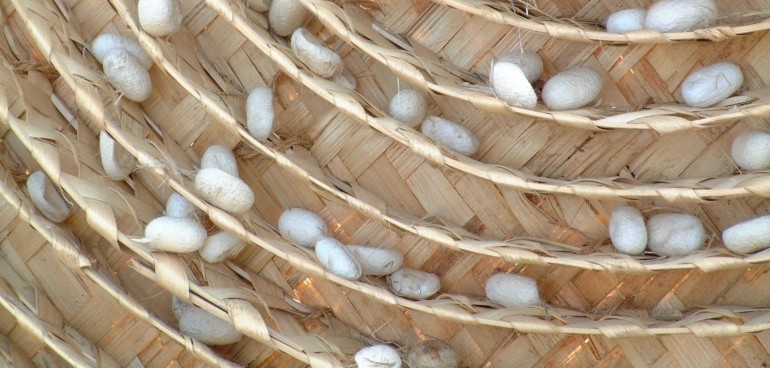UN INT Intro Text w/ Centered Large Responsive Image - *Important Note* You must UNLINK this shared library component before making page-specific customizations.
These brands sell products that condemn gentle, sensitive animals to a lifetime of suffering. They need to hear from you that items made with materials taken from animals' bodies have no place on shelves or in wardrobes, especially when there are endless stylish vegan fashions available that no one had to die for. Urban Outfitters, Anthropologie, and Free People already sell luxurious animal-free textiles, and they also banned items made with fur, angora, and exotic skins after learning how these industries abuse animals. So, what is stopping them from removing all animal-derived items – products of extreme suffering – from their stores? Please tell the brands that you'll be shopping elsewhere until they commit to selling only vegan materials.
Alpacas Suffer and Scream for Knitwear
A disturbing undercover investigation revealed that workers on the world's largest privately owned alpaca farm – which supplies alpaca fibre to Anthropologie and Free People – hit, kicked, tied down, and mutilated alpacas for their wool. Pregnant alpacas were slammed onto tables, causing many of them to cry out and vomit in fear. The terrified animals were stretched out using devices that look like medieval torture racks, and many were left bleeding from deep, painful wounds caused by careless shearing.
Major clothing companies, including H&M and UNIQLO, banned alpaca fleece following PETA's exposé. There's no reason why Urban Outfitters can't make the compassionate decision to follow suit.
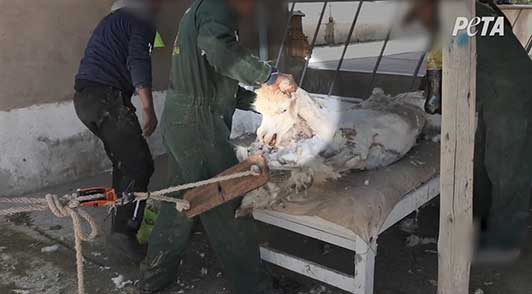
Wool Is Not 'Just a Haircut'
Wool Is Not 'Just a Haircut'
No matter where in the world PETA and our international affiliates' investigators have visited shearing sheds – and no matter what those operators claimed about welfare standards – extreme abuse of sheep is rampant. Video footage – compiled in 14 exposés of 117 wool industry operations on four continents – shows gentle sheep enduring beatings, being stamped on, and being kicked, including in the face.
Shearers – who are usually paid by volume, rather than by the hour – work hastily and recklessly, often leaving sheep injured and bleeding. Deep cuts are roughly stitched up without any pain relief.
Don't believe the fluff: the wool industry is rooted in the exploitation of animals. We can stay warm in vegan textiles, such as cotton, flannel, Tencel, and even recycled plastics.
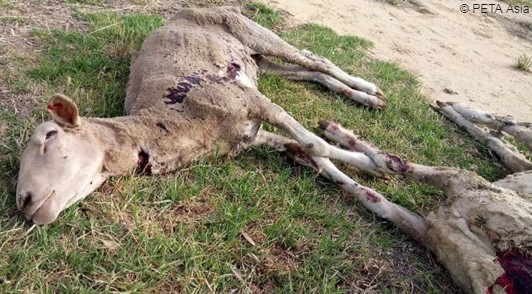
Give Mohair a Miss, and Cancel Cashmere
Large brands – including Gap, Banana Republic, Forever 21, and H&M – dropped mohair after a disturbing PETA Asia investigation exposed this industry's systemic cruelty.
Workers at 12 farms in South Africa where angora goats are raised for mohair were observed dragging them across the floor, picking them up by the tail, throwing them, and mutilating them with knives and pliers. Goats are exploited for their hair for several years, until their teeth wear down from an unsuitable diet and they can no longer eat. Then, most are sold for painful, crude backyard slaughter, long before they reach their natural life expectancy.
And a PETA Asia investigation into cashmere operations in China and Mongolia found goats screaming in pain and fear as workers held them down, twisted their legs, and tore out their hair with sharp metal combs. Injured animals did not receive pain relief or veterinary care. One worker poured rice wine into a goat's bloody wound. Once goats are no longer profitable, they're dragged into the abattoir, crudely stunned with a hammer blow to the head, and left to bleed out on the floor.
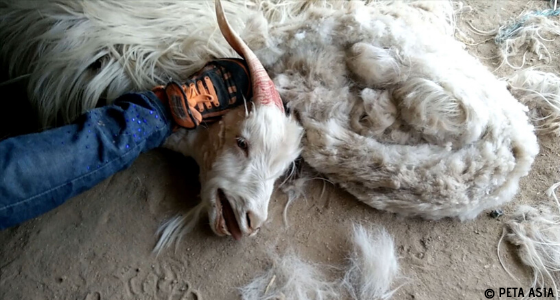
Leather Is Bad to the Bone
Leather is a co-product of the meat industry. This means that buying leather shoes, bags, or jackets directly funds the slaughter of cows, who are social, curious, and gentle. We'd never wear the skin of a dog or cat, but it's just as wrong and speciesist to wear the skin of a cow.
Numerous PETA affiliate investigations in multiple countries – including at ranches supplying JBS SA, the largest leather processor in the world – found that cows are routinely beaten and electroshocked and calves are branded on the face. In India, handlers force exhausted cows to keep walking on long, gruelling treks to their deaths by rubbing hot peppers and tobacco into their eyes.
Many cows are sent to slaughter on long journeys by ship and lorry, on which they suffer from severe crowding, lack of sufficient food and water, and disease. Another investigation revealed that injured or weakened cows – who were unable to walk – were hoisted off a ship by crane, their entire body weight dangling from a single leg.
Using cows for leather causes extreme suffering, and it's unnecessary: forward-thinking companies are making animal- and eco-friendly leather out of grapes, apples, cork, and recycled bottles.
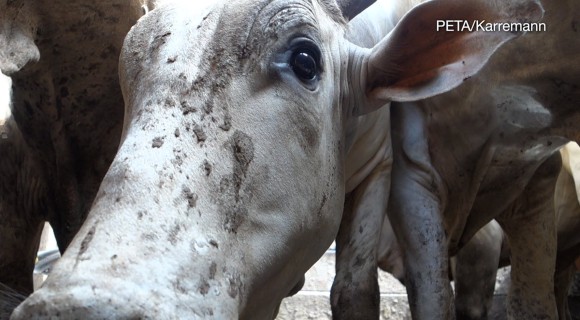
Down With Down!
PETA exposés have shown the immense suffering of birds imprisoned and eventually killed in the down industry. Many geese are live-plucked so that their down can be cruelly torn out multiple times throughout their short lives. The terrified birds shriek as they're restrained, sometimes with a human's entire body weight pressing on their delicate necks.
Labels may make shoppers feel better, but they're meaningless to birds who are trapped in the cruel down industry: some companies claim to use "responsible" or "non–live plucked" down, but investigations have revealed that the labels are frequently meaningless.
Moreover, all birds whose down goes into commercial goods are ultimately shipped to abattoirs, where they're hung upside down, their throats are cut, and their bodies are plunged into the scalding-hot water of the defeathering tank.
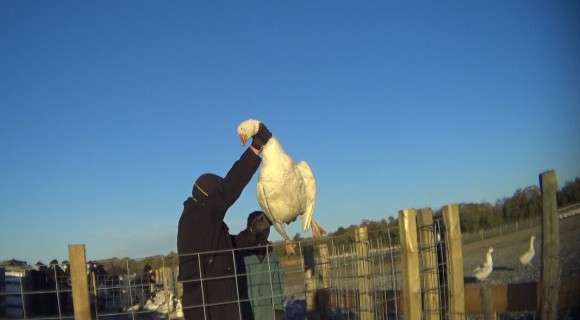
Silkworms Suffer for Silk
Silkworms may be small, but like all individuals, they value their lives and don't want to die. They have a central nervous system, respond to stimuli, and startle when surprised. Yet billions of these tiny beings are killed every year for silk clothing by being boiled alive or gassed inside their cocoons. There's simply no need for silk, especially since vegan textiles like rayon are widely available, as are a number of innovative new materials that mimic silk.
